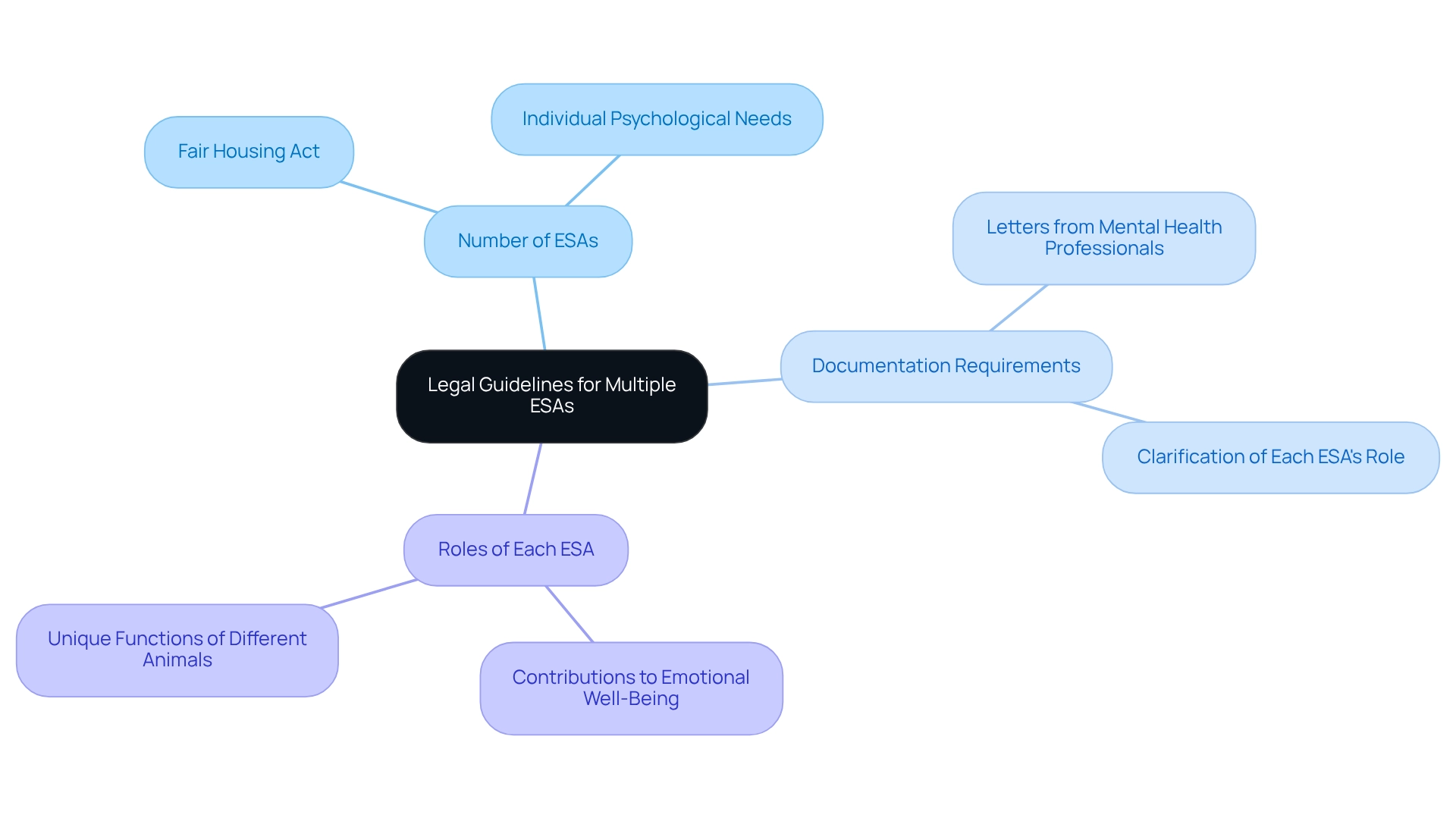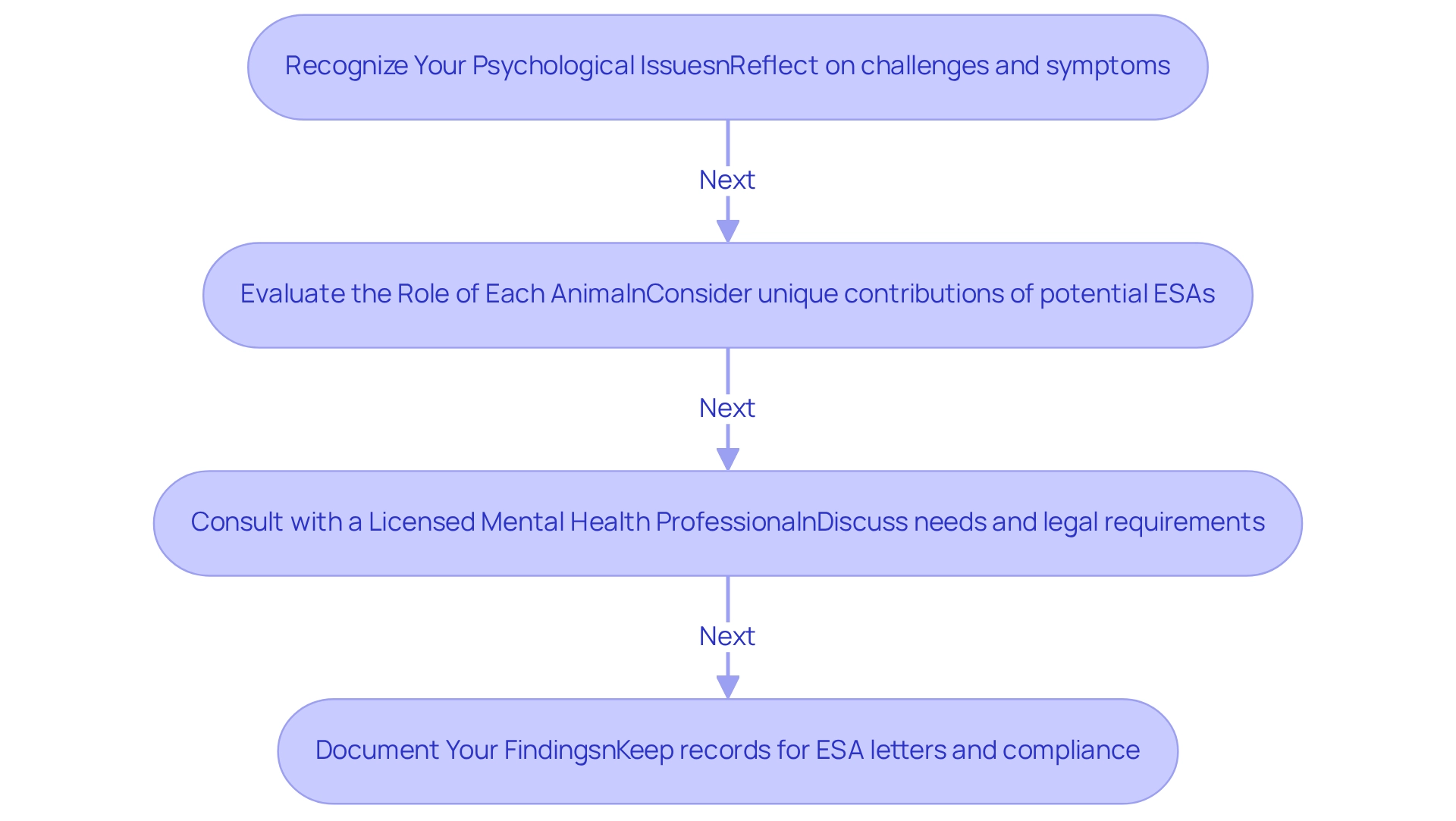

How Many ESA Can I Have? Assessing Your Eligibility and Needs
by Lena Park
Last updated: June 26, 2025
Verified and Approved by:
Angela Morris,
MSW, LCSW
Fact Checked

Overview
This article thoughtfully explores the question of how many emotional support animals (ESAs) one can have, highlighting that, under the Fair Housing Act, there is no legal limit as long as each ESA fulfills a unique therapeutic purpose.
It compassionately underscores the importance of obtaining documentation from a licensed mental health professional to substantiate the need for multiple ESAs.
This documentation should detail how each animal contributes to the individual’s emotional well-being, providing reassurance and support for those navigating their mental health journey.
Introduction
In a world where mental health challenges are increasingly recognized, many individuals find themselves seeking comfort and relief. Emotional Support Animals (ESAs) have emerged as vital companions in this journey. Unlike service animals, ESAs provide emotional support without the need for specialized training, yet their impact on mental well-being can be profound.
As the need for emotional support grows, navigating the legal landscape surrounding multiple ESAs can feel overwhelming. This article explores:
- The essential roles these animals play
- The legal guidelines governing their presence
- The steps individuals can take to assess their needs and obtain official documentation
By understanding these aspects, you can advocate for your rights while ensuring you receive the support necessary for your mental health journey. Remember, you are not alone in this; support is available, and together we can navigate these challenges.
Understand Emotional Support Animals and Their Role
Emotional Support Animals (ESAs) are beloved pets that provide comfort and assistance to those navigating emotional or psychological challenges. Unlike assistance animals, which are trained for specific tasks and have legal rights to access public spaces under the ADA, emotional support animals do not require specialized training. Their primary role is to offer companionship and alleviate symptoms of mental health issues such as anxiety, depression, and PTSD. Understanding the role of emotional support companions is crucial for individuals considering different types of pets, as each support animal must fulfill a unique therapeutic purpose to justify their presence in a home.
For example, one support animal may help ease anxiety, while another might provide relief from depression. This distinction is essential when assessing the need for various emotional support animals, as each must be deemed necessary by a licensed mental health professional. Additionally, while ESAs provide invaluable emotional support, they do not possess the same legal rights and access to public areas as service dogs. This is an important consideration for individuals seeking to understand their rights and responsibilities concerning these cherished companions.
Reflecting on your own experiences, have you ever felt that a pet could offer you the emotional support you need? The presence of an ESA can be a profound source of comfort, helping to create a sense of stability and companionship during difficult times. With the right support, you can navigate your emotional journey with a loving companion by your side.
Explore Legal Guidelines for Multiple ESAs
Under the Fair Housing Act (FHA), individuals are not limited in the number of emotional support companions they can have, leading to inquiries about how many ESA can I have. However, it is essential to determine how many ESA can I have, as each emotional support animal (ESA) is crucial for the individual’s psychological needs.
Property owners may inquire about the necessity for multiple emotional support animals, and it is vital to provide documentation from a qualified mental health professional that explains the unique role of each pet. For instance, if a tenant has two emotional support animals, the letter should clarify how each one contributes to different aspects of the tenant’s emotional well-being.
This understanding not only empowers individuals to advocate for their rights but also ensures compliance with housing regulations, fostering a supportive environment where their needs are recognized and respected.

Assess Your Needs and Eligibility for Multiple ESAs
To effectively evaluate your needs for emotional support creatures (ESAs), it’s important to follow these thoughtful steps:
-
Recognize Your Psychological Issues: Take a moment to reflect on your psychological challenges and how they impact your daily life. Consider whether specific symptoms might be eased by different creatures, as various conditions often require distinct forms of support. Emotional Support Creatures can provide comfort by alleviating symptoms associated with psychological conditions, making it essential to understand how each creature can enhance your well-being.
-
Evaluate the Role of Each Animal: Think about the unique contributions each potential ESA could make in your life. For instance, one animal might help with social anxiety, while another could offer solace during depressive episodes. This highlights the diverse benefits that various emotional support animals can provide. This assessment is crucial to ensure you receive the support you need on your journey to well-being.
-
Consult with a Licensed Mental Health Professional: It’s a good idea to schedule a consultation to discuss your needs in detail. A certified expert can help assess how many ESAs you can have to determine if having multiple emotional support animals is necessary and beneficial, ensuring that your approach is tailored to your specific psychological needs. They can also provide guidance on the legal requirements for obtaining ESA letters, which must be issued by licensed professionals.
-
Document Your Findings: Keep a thorough record of your evaluation and any recommendations from your healthcare provider. This documentation will be vital for acquiring valid emotional support animal letters, which are necessary for compliance with housing regulations, including those that allow emotional support animals in university accommodations.
Research indicates that a significant percentage of individuals express a need for more than one emotional support creature, underscoring the importance of personalized evaluations. Furthermore, studies show that emotional support animals can greatly enhance psychological well-being by alleviating symptoms of various conditions, thus improving overall wellness. Consulting with mental health specialists can provide valuable insights into the benefits of having several emotional support animals, ensuring that you receive the assistance needed for your emotional well-being journey.

Obtain Official ESA Letters for Each Animal
To obtain official ESA letters for each pet, please follow these supportive steps:
- Schedule an Evaluation: Begin by reaching out to a certified psychological expert who understands the vital role of Emotional Support Animals (ESAs). It’s important to ensure they are open to evaluating how many ESA can I have.
Prepare for the Consultation: Gather any relevant paperwork related to your psychological conditions, along with your reflections on how each animal will provide support. This preparation is crucial, as it helps the professional understand your unique needs and the emotional connection you share with your pets. - Understand Housing Guidelines: It’s essential to know that Assistance Animals are permitted only within your assigned residence hall bedroom and not in shared spaces like classrooms or dining areas. Make sure your pets are fully house-trained and up to date on vaccinations, as these are necessary for compliance.
Receive your ESA letters: If approved, the professional will provide separate ESA letters for each animal, including information on how many ESA can I have and detailing their specific roles in supporting your mental health.
Keep Copies of Your Letters: Safeguard these letters, as you will need to present them to landlords or airlines when requesting accommodations for your ESAs. - Complete Our Assessment: We invite you to take our brief assessment to share your situation and emotional support needs. After submitting the required forms, we will connect you with a licensed medical professional for a personalized consultation and thorough evaluation to determine your eligibility for an ESA.
Remember, you are not alone in this journey, and there is support available to help you along the way.

Conclusion
Emotional Support Animals (ESAs) serve an essential role in enhancing the mental health and well-being of those navigating emotional or psychological challenges. Many individuals face significant struggles in their daily lives, and understanding the unique contributions of ESAs can empower them to advocate for their needs effectively, especially when considering the support of multiple animals. Each ESA must fulfill a specific therapeutic purpose, highlighting the necessity of obtaining clear documentation and a thorough assessment from a licensed mental health professional.
The legal landscape surrounding ESAs can indeed be daunting. However, the Fair Housing Act offers a vital framework that permits the presence of multiple ESAs, provided they are deemed necessary for an individual’s mental health. This legal clarity is crucial, as it allows individuals to assert their rights confidently, ensuring they can access the emotional support they need in their living spaces.
Ultimately, embarking on the journey to obtain official ESA letters and understanding their roles is a significant step toward promoting mental wellness. Consulting with mental health professionals, maintaining proper documentation, and thoroughly assessing personal needs are essential practices that can lead to a more fulfilling life with the companionship of these remarkable animals. As awareness of the benefits of ESAs continues to expand, it is important to recognize that seeking help and advocating for one’s mental health is a commendable and courageous step forward. Have you considered how an ESA might enrich your life? Remember, you are not alone in this journey, and support is available to you.
Frequently Asked Questions
What are Emotional Support Animals (ESAs)?
Emotional Support Animals (ESAs) are pets that provide comfort and assistance to individuals facing emotional or psychological challenges. Their primary role is to offer companionship and help alleviate symptoms of mental health issues such as anxiety, depression, and PTSD.
How do ESAs differ from assistance animals?
Unlike assistance animals, which are trained for specific tasks and have legal rights to access public spaces under the ADA, ESAs do not require specialized training and do not have the same legal rights to access public areas.
What is the role of a licensed mental health professional in relation to ESAs?
A licensed mental health professional must deem an ESA necessary for an individual, as each support animal must fulfill a unique therapeutic purpose to justify their presence in a home.
Can different types of ESAs help with various mental health issues?
Yes, different support animals can provide assistance for various mental health issues. For example, one ESA may help ease anxiety, while another might provide relief from depression.
What responsibilities do individuals have regarding ESAs?
Individuals must understand that while ESAs offer emotional support, they do not have the same legal rights as service dogs, which is an important consideration for those seeking to understand their rights and responsibilities concerning these companions.
How can an ESA impact a person’s emotional well-being?
The presence of an ESA can be a profound source of comfort, helping to create a sense of stability and companionship during difficult times, which can assist individuals in navigating their emotional journeys.
Certify Your Emotional Support Animal Today

Why You Can Rely on Us?
At Wellness Wag, we believe your pet deserves care rooted in both science and compassion. Each article is carefully researched, written in clear language for pet owners, and then reviewed by qualified professionals to ensure the information is evidence-based, current, and practical for real-life care. Our goal is to help you feel confident in making informed decisions about your pet’s health and well-being.
Reviewed by
Angela Morris, MSW, LCSW
Angela is a licensed clinical social worker with 20 years of experience in patient advocacy and community mental health. She has assisted numerous clients with ESA evaluations and brings a deep understanding of disability accommodations, ensuring that all information is accurate, supportive, and practical.

Written by :
Lena Park
Last Updated :
June 26, 2025












